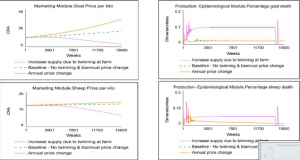Peste des petits ruminants (PPR) is a devastating viral disease affecting small ruminants, primarily sheep and goats, in many parts of the world, including Senegal. Vaccination is the key tool in the global strategy to control and eventually eradicate PPR. However, the socioeconomic impacts of PPR control strategies on both farm-level profitability and national food security need thorough examination.
A recent study in Senegal used system dynamics modelling to assess the impact of different vaccination scenarios on both micro- and macroeconomic indicators. The study explored nine vaccination strategies, accounting for variables such as vaccination coverage, vaccine wastage, and government subsidies. The findings revealed that even at the current vaccination coverage of 26.5%, farm households saw an increase in their gross margins and food security indicators. Under the recommended 70% vaccination coverage, these benefits were even more significant, with gross margins increasing by $72.23 per household annually, alongside an improvement in per capita meat consumption.
This study demonstrates the importance of integrating vaccination strategies not only as a disease control tool but also as a driver of economic growth and food security. Policymakers are encouraged to use these findings to promote vaccination as part of a broader food security strategy.
Journal article: Aboah, J., Apolloni, A., Duboz, R., Wieland, B., Kotchofa, P., Okoth, E., & Dione, M. (2023). Ex-ante impact of pest des petits ruminant control on micro and macro socioeconomic indicators in Senegal: A system dynamics modelling approach. PLoS ONE.
Summary by Faith Oluwamakinde











